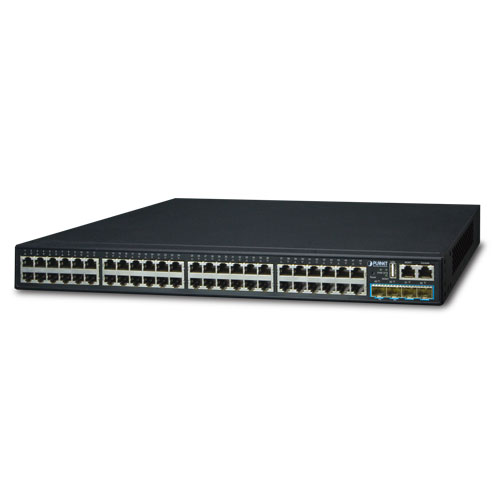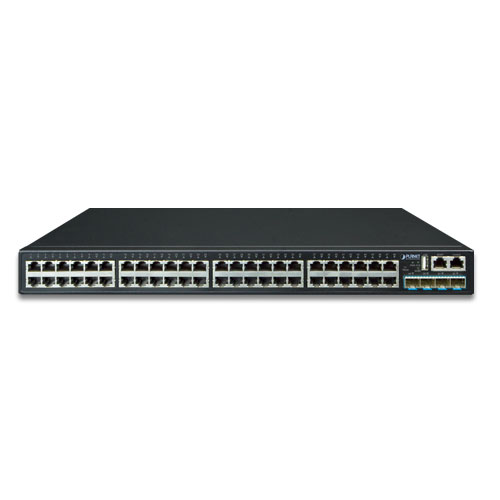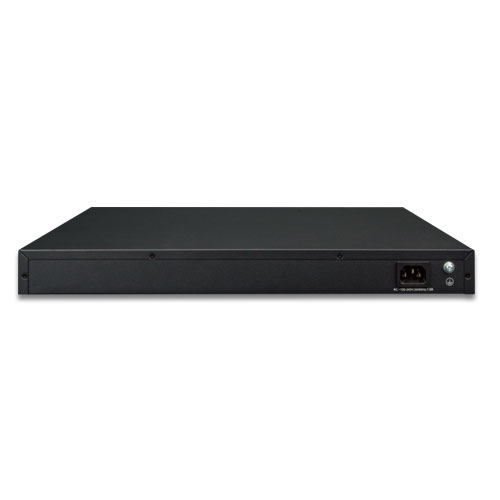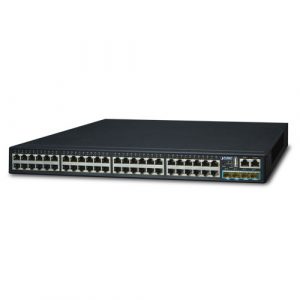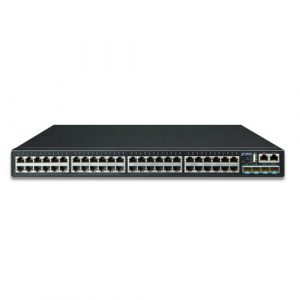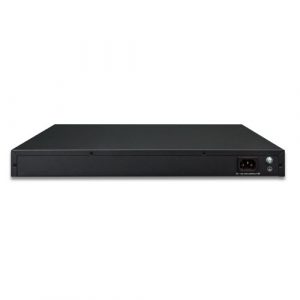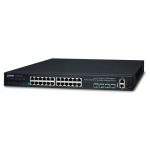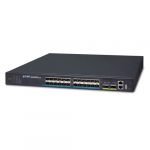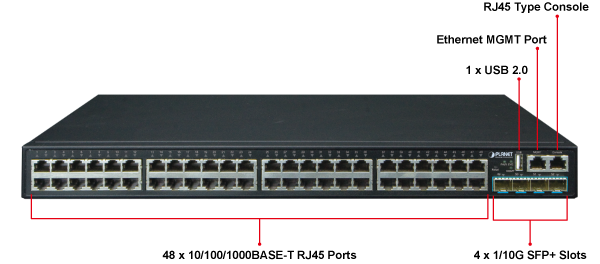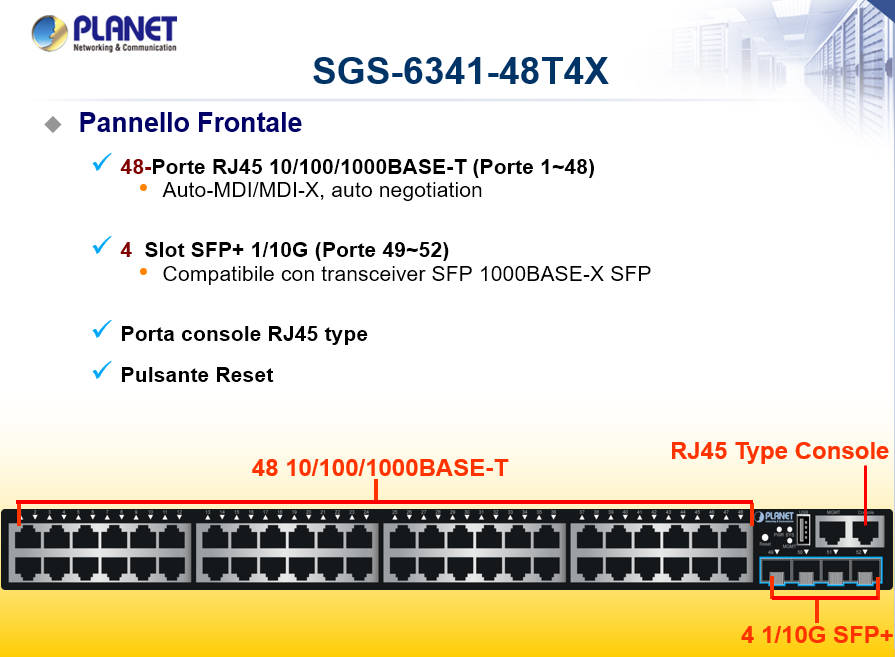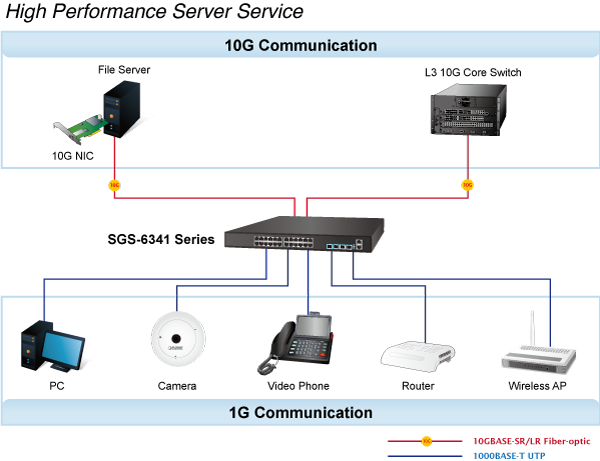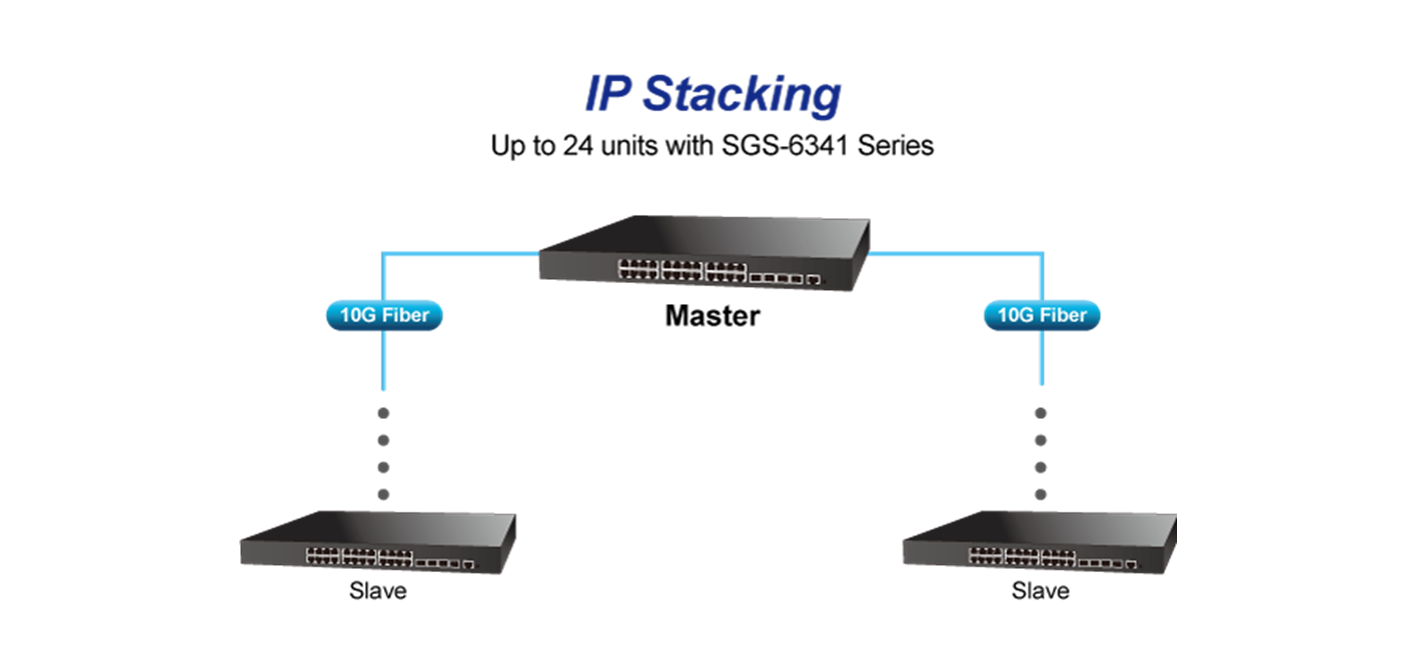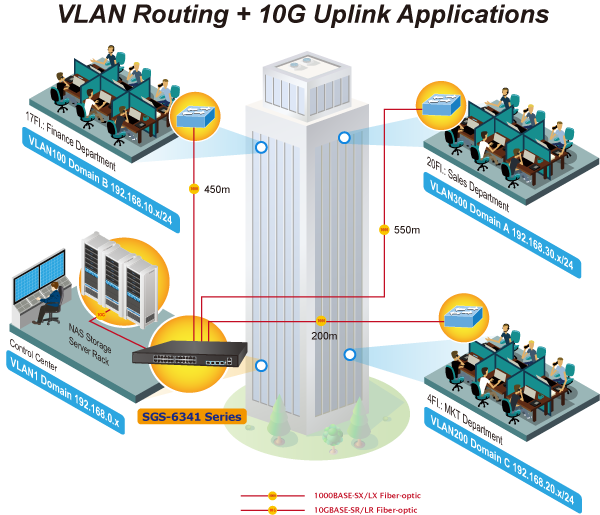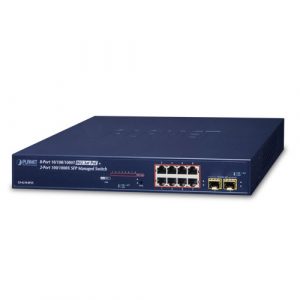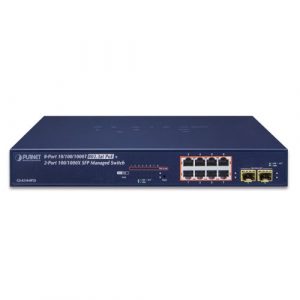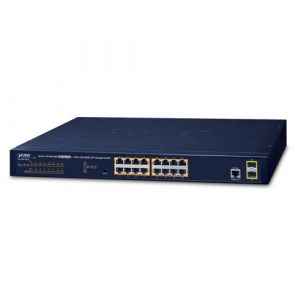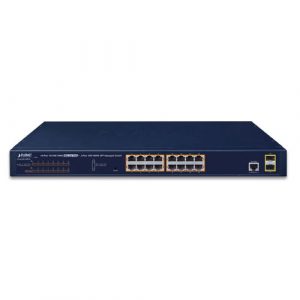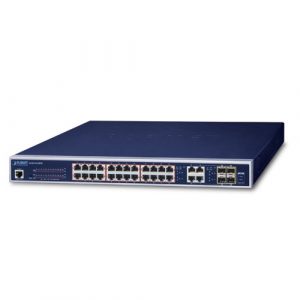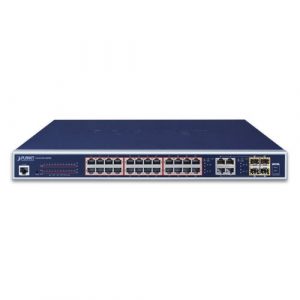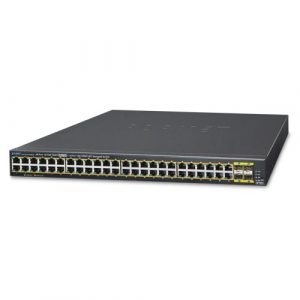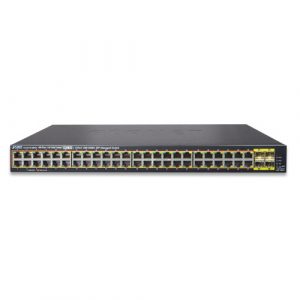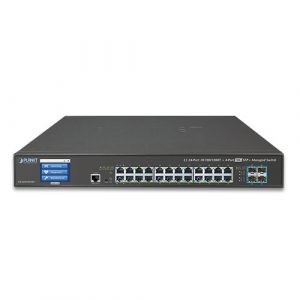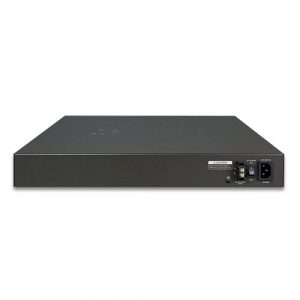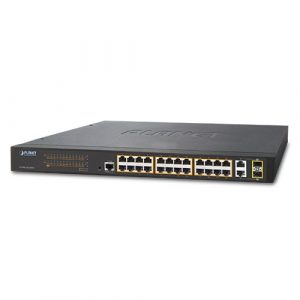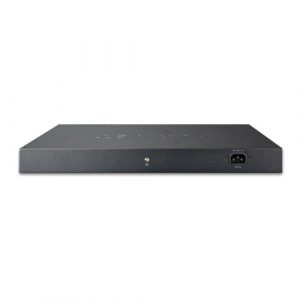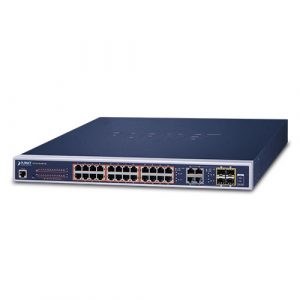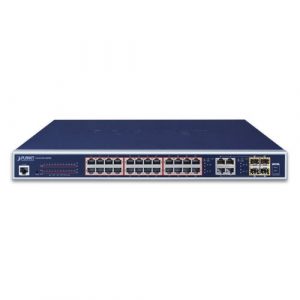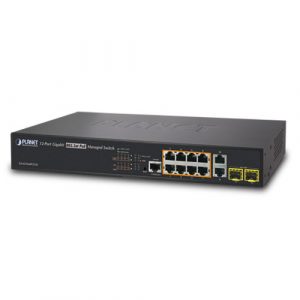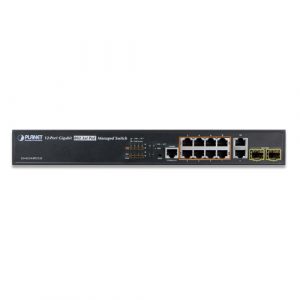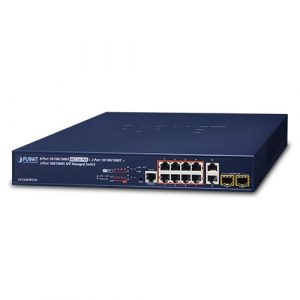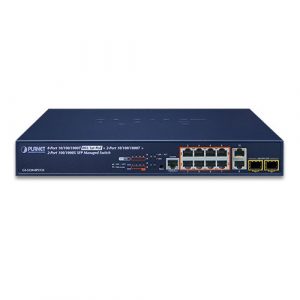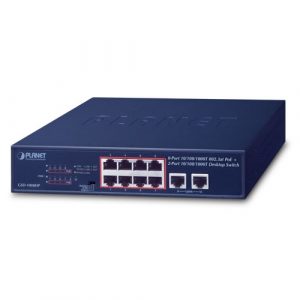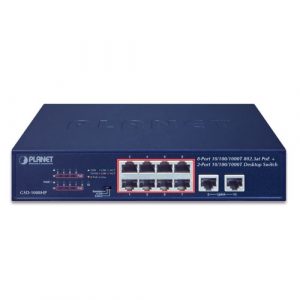SGS-6341-48T4X
Layer 3 48-Port 10/100/1000T + 4-Port 10G SFP+ 1 RJ45 Type Console+1 MGTP Port + 1 USB 2.0+ IP Stackable Managed Gigabit Switch
- Applicazioni
- SPECIFICHE
- DOWNLOAD
Descrizione
Potente soluzione di routing Layer 3 per reti aziendali e di data center
PLANET SGS-6341-48T4X è uno switch Gigabit gestito impilabile Layer 3 che fornisce prestazioni ad alta densità, routing statico Layer 3, RIP (Routing Information Protocol) e OSPF (Open Shortest Path First). Con fabric di commutazione da 176 Gbps e 4 porte uplink da 10 Gbps, SGS-6341-48T4X può gestire quantità di dati estremamente grandi in una topologia sicura che si collega a un backbone aziendale o a server ad alta capacità. Le potenti funzionalità WRR (Weighted Round Robin) e di sicurezza di rete consentono a SGS-6341-48T4X di eseguire un efficace controllo del traffico dati per applicazioni ISP e VoIP aziendale, streaming video e multicast.
Soluzione di rete mesh ad alta disponibilità per sistemi Big Data
Grazie all’evoluzione della tecnologia Ethernet in fibra ottica, con funzionalità di alta flessibilità, estensione e facilità di installazione, lo switch SGS-6341-48T4X offre una velocità di scambio dati fino a 176Gbps tramite interfaccia in fibra ottica e una distanza di trasmissione che può essere estesa a 120km.
Fornisce solida e rapida capacità di auto recupero per prevenire interruzioni del servizio e intrusioni esterne; inoltre, incorpora nella rete di automazione del cliente la tecnologia IEEE 802.1s MSTP (Multiple Spanning Tree Protocol, spanning tree by VLAN), per potenziare l’affidabilità del sistema e il tempo di attività. SGS-6341-48T4X è la soluzione ideale per data center, fornitori di servizi e telecom per creare una connessione ridondante e stabilire un’elevata larghezza di banda per i Data Center.
Funzionalità di Sicurezza e QoS per Core /Data Center
SGS-6341-48T4X esegue la funzione switch fabric non bloccante da 176 Gigabit al secondo, fornendo facilmente una rete Ethernet locale ad elevata larghezza di banda 10 Gbps per il backbone del reparto. Con le quattro porte SFP+ integrate, fornisce l’uplink alla rete backbone tramite i moduli Ethernet 10G SFP + LR/SR; migliora ulteriormente l’efficienza della rete e protegge i client di rete offrendo le funzionalità di sicurezza e QoS.
Gestione IP stacking
SGS-6341-48T4X supporta la funzione di IP stacking che permette ai gestori di rete di configurare facilmente fino a 24 switch della stessa serie tramite un singolo indirizzo IP, invece di dover collegare e impostare ciascuna unità una per una. La tecnologia IP stacking raggruppa gli switch della serie SGS-6341 per consentire la gestione centralizzata mediante un’unica unità, indipendentemente dalla posizione fisica o dal tipo di switch, purché siano collegati alla stessa rete locale
Routing VLAN livello 3
Il modello SGS-6341-48T4X è indubbiamente una soluzione ideale e conveniente per le imprese; integra robusti protocolli di routing layer 3, garantendo un instradamento affidabile tra VLAN e segmenti di rete. I protocolli di routing possono essere applicati mediante l’interfaccia VLAN.
Gestione efficiente e sicura
Per una gestione efficiente, lo switch è dotato di interfacce di gestione console, Web e SNMP. Con la sua interfaccia di gestione integrata, basata su Web, SGS-6341-48T4X offre una facile struttura di gestione e configurazione platform-independent. Supporta lo standard SNMP (Simple Network Management Protocol) e può essere gestito tramite qualsiasi software di gestione standard.
Per ridurre i tempi di configurazione, lo switch offre comandi Cisco-like tramite Telnet o porta console, eliminando la necessità per l’utente di apprendere nuovi comandi di questo modello di switch. Inoltre, SGS-6341-48T4X consente una gestione remota sicura, supportando la connessione SSH che crittografa il contenuto del pacchetto ad ogni sessione
| Hardware Specifications | |
|---|---|
| Copper Ports | 48 10/100/1000BASE-T RJ45 auto-MDI/MDI-X ports |
| SFP+ Slots | 4 10GBASE-SR/LR SFP+ interface (port-49 to port-52) Compatible with 1000BASE-SX/LX/BX SFP transceiver |
| Console | 1 x RJ45-to-RS232 serial port (115200, 8, N, 1) |
| Switch Architecture | Store-and-forward |
| Switch Fabric | 176Gbps/non-blocking |
| Switch Throughput | 130.95Mpps |
| Address Table | 16K MAC address table with auto learning function |
| Shared Data Buffer | 1.5MB |
| Flow Control | Back pressure for half-duplex IEEE 802.3x pause frame for full-duplex |
| Jumbo Frame | 10KB |
| LED | System: PWR/MGMT/SYS Ports: 10/100/1000T RJ45 Port: LNK/ACT 1/10G SFP+ slot: LNK/ACT |
| Dimensions (W x D x H) | 440 x 240 x 43.6 mm, 1U height |
| Weight | 3471g |
| Power Consumption | 46.4 watts/158.22 BTU |
| Power Requirements | AC 100~240V, 50/60Hz |
| Management Function | |
| System Configuration | Console, Telnet, SSH, Web browser, SNMP v1, v2c and v3 |
| Management | Supports both IPv4 and IPv6 addressing Supports the user IP security inspection for IPv4/IPv6 SNMP Supports MIB and TRAP Supports IPv4/IPv6 FTP/TFTP Supports IPv4/IPv6 NTP Supports RMON 1, 2, 3, 9 four groups Supports the RADIUS authentication for IPv4/IPv6 Telnet user name and password Supports IPv4/IPv6 SSH The right configuration for users to adopt RADIUS server’s shell management Supports CLI, console, Telnet Supports SNMP v1, v2c and v3 Supports Security IP safety net management function: avoid unlawful landing at nonrestrictive area Supports Syslog server for IPv4 and IPv6 Supports TACACS+ |
| IPv4 Layer 3 functions | |
| IP Routing Protocol | Static route, RIPv1/v2, OSPFv2, BGPv4 Policy-based routing (PBR) LPM routing (MD5 authentication) |
| Multicast Routing Protocol | IGMP v1/v2/v3, DVMRP, PIM-DM/SM, PIM-SSM |
| Layer 3 Protocol | VRRP v1/v3, ARP, ARP Proxy |
| IPv6 Layer 3 functions | |
| IP Routing Protocol | RIPng, OSPFv3, BGPv4+, IPv6 LPM Routing,IPv6 Policy-based Routing(PBR) IPv6 VRRPv3,IPv6 URPF,IPv6 RA |
| Multicast Routing Protocol | PIM-SM/DM for IPv6 MLD for IPv6 (v1) MLDv1/v2 MLD Snooping, 6to4 Tunnels IPv6 Any Cast RP Multicast receive control Illegal multicast source detect |
| Layer 3 Protocol | Configured Tunnels, ISATAP, GRE Tunnel |
| Other | ICMPv6,ND,DNSv6 |
| Layer 2 Function | |
| Port Configuration | Port disable/enable Auto-negotiation 10/100/1000Mbps full and half duplex mode selection Flow control disable/enable Bandwidth control on each port Port loopback detect |
| Port Status | Display each port’s speed duplex mode, link status, flow control status and auto negotiation status |
| VLAN | 802.1Q tagged based VLAN, up to 256 VLAN groups 802.1ad Q-in-Q (VLAN stacking) GVRP for VLAN management Private VLAN Edge (PVE) supported Protocol-based VLAN MAC-based VLAN IP subnet VLAN |
| Bandwidth Control | TX/RX/Both |
| Link Aggregation | IEEE 802.3ad LACP/static trunk Supports 12 groups with 8 ports per trunk group |
| QoS | 8 priority queues on all switch ports Supports strict priority and Weighted Round Robin (WRR) CoS policies Traffic classification: – IEEE 802.1p CoS/ToS – IPv4/IPv6 DSCP – Port-based WRR |
| Multicast | IGMP v1/v2/v3 snooping Querier mode support MLD v1/v2 snooping Multicast VLAN Register (MVR) |
| Access Control List | Supports Standard and Expanded ACL IP-based ACL/MAC-based ACL Time-based ACL Up to 512 entries |
| Security | Supports MAC + port binding IPv4/IPv6 + MAC + port binding IPv4/IPv6 + port binding Supports MAC filter ARP scanning prevention |
| Authentication | IEEE 802.1x port-based network access control AAA authentication: TACACS+ and IPv4/IPv6 over RADIUS |
| SNMP MIBs | RFC 1213 MIB-II RFC 1215 Internet Engineering Task Force RFC 1271 RMON RFC 1354 IP-Forwarding MIB RFC 1493 Bridge MIB RFC 1643 Ether-like MIB RFC 1907 SNMP v2 RFC 2011 IP/ICMP MIB RFC 2012 TCP MIB RFC 2013 UDP MIB RFC 2096 IP forward MIB RFC 2233 if MIB RFC 2452 TCP6 MIB RFC 2454 UDP6 MIB RFC 2465 IPv6 MIB RFC 2466 ICMP6 MIB RFC 2573 SNMP v3 notify RFC 2574 SNMP v3 vacm RFC 2674 Bridge MIB Extensions (IEEE 802.1Q MIB) RFC 2674 Bridge MIB Extensions (IEEE 802.1P MIB) |
| Standard Conformance | |
| Regulatory Compliance | FCC Part 15 Class A, CE |
| Standards Compliance | IEEE 802.3 10BASE-T IEEE 802.3u 100BASE-TX IEEE 802.3z Gigabit 1000BASE-SX/LX IEEE 802.3ab Gigabit 1000BASE-T IEEE 802.3ae 10Gb/s Ethernet IEEE 802.3x flow control and back pressure IEEE 802.3ad port trunk with LACP IEEE 802.1D Spanning Tree Protocol IEEE 802.1w Rapid Spanning Tree Protocol IEEE 802.1s Multiple Spanning Tree Protocol IEEE 802.1p Class of Service IEEE 802.1Q VLAN tagging IEEE 802.1X port authentication network control IEEE 802.1ab LLDP RFC 768 UDP RFC 793 TFTP RFC 791 IP RFC 792 ICMP RFC 2068 HTTP RFC 1112 IGMP v1 RFC 2236 IGMP v2 RFC 3376 IGMP v3 RFC 2710 MLD v1 FRC 3810 MLD v2 RFC 2328 OSPF v2 RFC 1058 RIP v1 RFC 2453 RIP v2 |
| Environment | |
| Operating | Temperature: 0 ~ 50 degrees C Relative Humidity: 5 ~ 90% (non-condensing) |
| Storage | Temperature: -10 ~ 70 degrees C Relative Humidity: 5 ~ 90% (non-condensing) |




